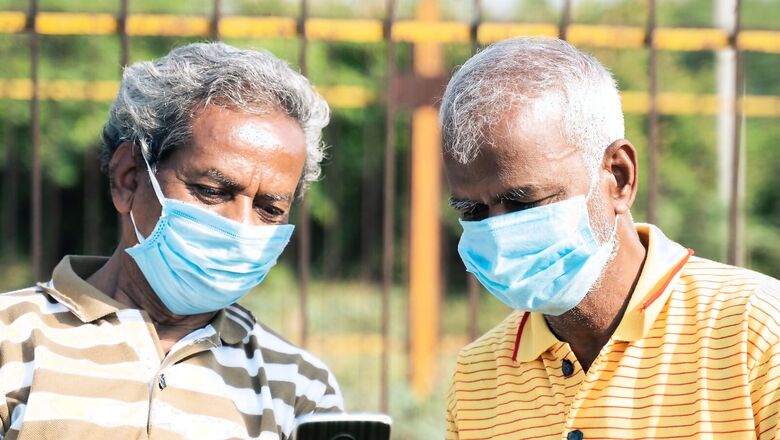
views
I was pleasantly surprised when a bunch of kids who showed complete disinterest in life and studies flowered as soon as they were allowed to resume physical schooling. They were diagnosed to be nearly suffering from depression, till they met their friends and teachers. Isolation for long periods can cause depression.
Mask Up and Connect Vigorously
Whether you are working from home or in hybrid mode, connectedness is a must for all. Globalisation has disconnected us as a people and COVID-19 pandemic has worsened it. Caged animals refuse to leave their incarcerated life after a long innings in manmade lock-ups. Many animals suffer from Learned Helplessness where they start believing that being confined is the new normal. They become listless and lose their fire.
Human beings too can suffer from the same fate. Frequent micro chats, catching up with friends at a local market restore human connect. Many have a million excuses of bad moods due to difficult family members, tough bosses, financial issues etc. But let us not lapse into a state of amnesic inertia and connect at all costs.
A corporate executive was promised an increment and a promotion but was denied both a few weeks ago. She suddenly decided to celebrate the same with few friends at a nearby park. Bhajia and homemade tea were on the menu. For someone who was used to five-star refreshments, this out-of-the-box gesture was different yet joyous. ‘I am yet alive and will work harder,’ she said, aligning herself to the realities of the ongoing pandemic.
A former Chief Justice in one of the High Courts — who has recently been promoted to the Supreme Court — visited the talukas and met judicial officers regularly to understand their difficulties during the middle of the second wave. This invigorated the officers as well the Judge.
Movement improves mood. Physical connections lead to burst of happy hormones and laughter dissolves tears, fears and anger. The excuses dissolve and troubles shrink in the mind. Creative solutions to problems emerge from the deepest crevices of the grey cells. Alongside this, practice ‘fanatic masking’ as masks are the best vaccine.
Hope is Infectious
In an ongoing support group that I conduct for family members who have lost their loved ones, a young man spontaneously shared, ‘Last night I joined a friend and bought some blankets for many homeless poor on the streets of Delhi and distributed them. They felt nice, of course, but we felt awesome.’
Joy of giving is being talked about by millions on the social media but the quiet energy experienced through brief or continuous bursts of ‘Invisible Giving’ is immeasurable. I have encountered hundreds of teachers who have arrested ‘drop out’ in schools by quietly helping children with mobile phones, books and paying their school fees from their small salaries across the country.
These silent soldiers generate million watts of ‘hope’ that infects thousands. Finding meaning in life is a gigantic mood lifter in an era of confusing mutations and islets of deep sorrow.
A group of young men from an MNC shyly narrated how they supplemented the incomes of a dozen labourers for months. I had to coax them to share and there were tears in their eyes while they spoke. ‘We forgot our EMIs, our expensive holidays and our boastful rants,’ they added.
A journalist between chasing two stories took time off to be a volunteer in a small street project to provide nutritional supplements in a slum, without her visiting card pinned on her shirt.
Many of us doctors have experienced hundreds of patients inquiring about our health and that of our families since the pandemic. This has never happened before. I get many messages daily from those whom I know as well as strangers asking me to take care. This is so nice. Reaching out heals and motivates.
Despondency meets its death in the fountain of compassion, which finds an expression in ‘meaningful giving’.
Time to Let Old Wounds Heal
Many clamp their minds in a catastrophe. Yet, in some, the steel cap of the mind bursts open and events along with associated feelings buried deep beneath find their way up, causing distinct unpleasantness in the present. The stories crave for closure.
A young lady came to me sharing her guilt of not talking to her elder sister for long after a minor misunderstanding though both were in the same business. This guilt erupted after she was diagnosed with COVID and later recovered. Without batting an eyelid she rushed to her sibling and wept. They hugged and patched up with more vigour and heart. Awareness of feelings hastens the process.
Seize the opportunity for sharing and forgiving. Your heart will feel lighter and mind healthier. Resilience is strengthened and coping becomes easier as family or friends become part of the team.
Mental Health Pandemic is Real
In a retrospective study of 236,379 patients diagnosed with COVID-19, the estimated incidence of neurological or psychiatric diagnosis in the following six months was 33.62 per cent (Lancet, May 2021).
The Omicron variant has provided a twist to the ongoing COVID-19 saga. The massive panic caused by the sheer numbers needs to be addressed. Experts, community leaders and political leaders need to engage and reassure the people. Details of institutions providing mental health relief need to be shared widely. Politicians who share homilies about COVID-appropriate behaviour should walk the talk.
Palpitation, loss of interest, feeling of impending doom, washing hands excessively, fear of going out, sadness, crying, thoughts of self-harm, irritability, hopelessness, worthlessness or any change in behaviour needs to be reported to a psychiatrist or a psychologist.
The pandemic has helped people refocus on being mindful and aware. In the US, armed forces have asked soldiers to practice yoga. Yoga, vipassana, mindfulness, restful sleep are as important as COVID protocols for managing the pandemic.
Yet distress causes natural ‘Stress Inoculation’ in many who see the pandemic as a blessing/sign to change. Pope Francis in his recent address said, ‘You humiliated the proud and powerful. We have been very proud to think that everything we have, everything we own, have been the result of our hard work. We have forgotten that it was your grace, your mercy, that made us who we are and has given us everything we have.’ Prayers inject resilience too. A virus has forced the world to rethink its priorities.
For me, 30 minutes of Pranayama, known in the US as Cardiac Coherent Breathing, and a walk for an hour helps beat the blues. Humour helps me thrive. I have worked all through the pandemic, so far, and I hope to continue doing that.
Dr Harish Shetty is a Psychiatrist at Dr L H Hiranandani Hospital with extensive experience in Disaster and Mental Health. The views expressed in this article are those of the author and do not represent the stand of this publication.
Read all the Latest Opinions here



















Comments
0 comment